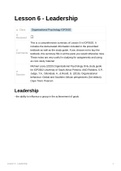Lesson 6 - Leadership
Class Organisational Psychology IOP2602
Reviewed
This is a comprehensive summary of Lesson 6 in IOP2602. It
includes the demarcated information included in the prescribed
textbook as well as the study guide. If you choose not to buy the
Comments textbook, this summary fills in all the parts you would otherwise miss.
These notes are very useful in studying for assignments and using
as core study material
Michael Leary (2020) Organisational Psychology Only study guide
for IOP2602 University of South Africa Pretoria. AND Robbins, S.P.,
Sources Judge, T.A., Odendaal, A., & Roodt, G. (2016). Organisational
behaviour: Global and Southern African perspectives (3rd edition).
Cape Town: Pearson
Leadership
~the ability to influence a group in the achievement of goals
Lesson 6 - Leadership 1
, Basic Approaches to Leadership
Trait Theories
theories that consider personal qualities and characteristics that differentiates
leaders from non-leaders
the theories state that successful leaders are basically born leaders
Big Five personality model: (5 basic personality traits)
openness to new experiences
conscientiousness
extraversion
agreeableness
neuroticism
Behavioral Theories
theories proposing that specific behaviors differentiate leaders from non-leaders
the theories state that it would be possible to train people to be leaders
Initiating structure - the extent to which a leader is likely to define and structure
their role and those of subordinates in the search for goal attainment
Consideration - the extent to which a leader is likely to have job relationships
characterized by mutual trust, respect for subordinates’ ideas, and regard for
their feelings
Employee-oriented leader - a leader who emphasizes interpersonal relations,
takes a personal interest in the needs of employees, and excepts individual
differences among members
Production-oriented leader - a leader who emphasizes technical or task
aspects of the job
Lesson 6 - Leadership 2





